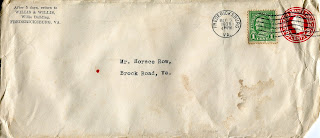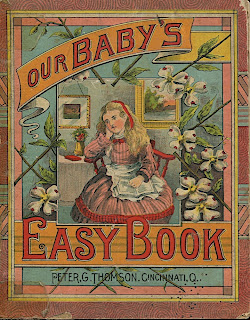 |
| Horace Row, early 1900s |
Horace Row, my grandfather, was born at Sunshine farm on July 25, 1882. He was the youngest child of George W.E. and Lizzie Row. He never knew his father, who died of pneumonia when Horace was just nine months old. His mother wrote of that sad time: "Dear 'little Hossie' as Father used to call you can't remember sitting in my lap and holding Father's hand while he was sick in bed."
 |
| Lizzie and Horace Row, 1883 |
For Christmas in 1886 Horace was given a copy of "Our Baby's Easy Book" by his cousin, eighteen year old Janie Williams of Lynchburg. Horace never met his Williams relatives, although Janie's mother Martha came to Spotsylvania in 1883. She arrived from Lynchburg four months after her brother George's death to provide a gift of considerable value to the Rows. She deeded her Greenfield legacy of 146 1/2 acres to Lizzie Row as trustee for her children. This act of generosity effectively doubled the size of Sunshine.
 |
| Horace's memo book |
 |
| From Horace's memo book |
When Horace was a young boy he kept a little memorandum book in which he jotted his random musings and various notes. In 1891 he wrote to his mother asking permission to go to Parker's Store: "Dear Mother--I want to go to the post offes today and go to the store to spend five ct if yes if you do not like I will not take my money. Horace Row"
 |
| Essay on George Washington |
 |
| Essay on George Washington |
While Horace grew up to be a successful farmer and was capable of sharp business dealing, he did not share his sister Mabel's academic gifts. Even as an adult he was a mediocre speller at best. His essay on Washington, written when he was eleven years old, is one of the better examples of his extant writing.
Although Horace would wait until he was thirty five years old before getting married, he certainly did not wait that long to take notice of the opposite sex. In a letter written from Rockbridge to Lizzie in 1898, his aunt Fannie Houston remarked: "Tell Horace to come over Christmas and I will have some girls to meet him. I believe he is the ladies man of the family." Several years later, as if to prove Fannie correct, Horace was the center of attention of now long forgotten Katie who wrote him a card in 1908.
 |
| Katie to Horace 1908 |
 |
| Katie to Horace 1908 |
After the death of his brother Houston in 1899, seventeen year old Horace became in effect the man of the family. His name now begins to appear on various receipts and invoices as he begins to take the reins of the family's business affairs. Lizzie's name becomes less prominent on these papers after this time. In 1909 a fire of unknown origin burned several outbuildings and their contents. The Rows did not carry insurance for such a loss and an appeal was published in the Fredericksburg Free Lance asking neighbors to help Horace rebuild.
In December 1910 Lizzie Row paid to have Sunshine surveyed by E.H. Randall. It was discovered during his work that the farm contained thirty acres more than previously supposed. The following year Horace bought his sister Mabel's interest in Sunshine for eight hundred dollars.
 |
| Mabel Wakeman deed to Horace Row 1911 |
In 1915 Horace sold timber rights to J.W. Masters on a section of land west of the road that led to Sunshine. Similar agreements provided the Rows with a source of income for years to come.
 |
| J.W. Masters contract 1915 |
 |
| J.W. Masters letter to Horace 1915 |
After a prolonged bachelorhood Horace Row married Fannie Kent on March 14, 1917. Horace and Fannie traveled to Washington, D.C. where the ceremony was officiated by Reverend H.B. Hosley, who had been pastor of the Wesleyan Pentecostal Church on 9th Street. Hosley would become a prominent member and historian of the Church of the Nazarene.
 |
| The Rows at Parker's Store, c.1921 |
Although Horace and Fannie waited until relatively late to marry, once wed they wasted little time in starting a family. Mary was born in January 1918 and Margaret followed in December the same year. George was born in 1920, Nancy in 1923 and Judy in 1928. As their children arrived Horace's mother relished her new role as a grandmother and she looked after them while Horace and Fannie worked on the farm and took care of business in town.
 |
| Granville Swift to Horace Row October 1921 |
 |
| Benjamin Willis to Horace Row May 1938 |
 |
| Benjamin Willis to Horace Row May 1938 |
Beginning in the early 1920s Granville Swift was the attorney and financial advisor for Horace and Lizzie Row. Granville was married to Lillian Rawlings, daughter of Benjamin Cason Rawlings. Granville had served in the House of Delegates and was later Commonwealth's Attorney for Fredericksburg. Granville was active in real estate and acted as a broker between investors like the Rows and persons seeking loans not available through the banks. By the late 1920s Horace began using Benjamin Willis for his legal and financial advice.
In October 1927 there occurred a testy exchange between Horace and Spotsylvania farmer M.W. Thorburn of Cloverdale Farm. Thorburn had bought a cow from Horace with the expectation that she would be able to provide milk for the fall. When the cow did not perform as expected Thorburn wrote: "As a honorable gentleman I trusted you, now the cow has not proved as you said. Then you want me to hold the bag. I would not have that brand on me for the best cow I have got...Now if you love the dollar above your honor, it is up to you."
Horace immediately responded in kind: "In reply to your letter of yesterday will say that you bought the cow on your own judgment...I have bought a lot of cows, calves and horses in my life and I found out that they sometimes do not turn out as I expected them to but I was man enough not to squeal but to take my medicine. If you will please show this letter to the men you talked to they will see that I am straight in my dealings as any man."
 |
| Horace and his children with Abbie and Tom Row, c.1929 |
 |
| Horace and Judy with Abbie Row c. 1929 |
 |
| Horace and Judy Row c. 1931 |
A few vignettes have come down through the years to us that provide a glimpse into Horace's life. His children remembered that Fannie would sit by his bed at night and read to him until he fell asleep. Like his father Horace was ambivalent about organized religion. He would drive the family to Shady Grove each Sunday but would not go inside with them. He would pace outside until the service was over and then drive them home. My mother remembered the time her brother George cut his arm on barbed wire. Horace sat him down at the kitchen table and sewed up his arm by the light of a kersoene lamp.
 |
| Branch Spalding to Horace Row 1936 |
Horace was one of nine landowners who deeded land to the Department of the Interior for the creation of Jackson Trail, which is part of the Fredericksburg and Spotsylvania National Military Park. Afterwards there would be confrontations between Horace and zealous Park Service employees about where Horace could drive his farm equipment. On at least one occasion he explained that his family had been crossing the road at that place for one hundred years and that he did not intend to stop doing so.
My mother kept a diary for the year 1939. Its entries are the usual girlish descriptions of the weather, trips to town, who she played with and so on. In mid-October that year she had written for several days: "Daddy sick...Daddy sick again..." On October 19, eleven days past my mother's eleventh birthday, Horace and George set out for Sperryville to pick apples. Horace had a heart attack and died in the orchard. My mother's entry for that day said nothing about friends or weather. "Daddy died today." Horace was buried at the family cemetery at Greenfield. He was the last Row laid to rest there.
 |
| From the Row family Bible |
 |
| From Horace's funeral |
 |
| From Horace's funeral |
 |
| From Horace's funeral |
 |
| Greenfield |




























